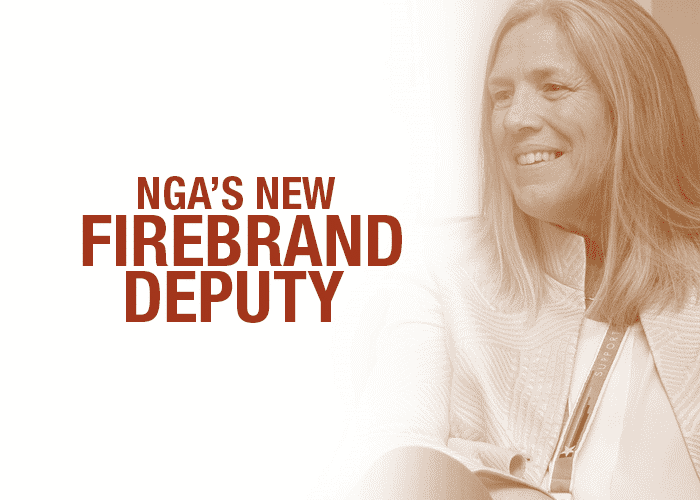NGA's New Firebrand Deputy

On a late Friday afternoon, soon after she began her deputy director job, the traffic in and out of Sue Gordon’s office was more indicative of an early Monday morning. A self-described firebrand, Gordon found time in her schedule for an interview with the Pathfinder to discuss her role as industry advocate and the opportunities and challenges the agency faces with its industry partners.
What do you uniquely bring to the role of industry advocate?
SG: Number one, my heritage throughout my career has been one of partnership with industry. I have great experiences with industry that make me see it as an incredible positive force. Secondly, I am not wedded to the past. Others may see me as someone who seeks change. I’m not about change, I’m about relevance. In order to be relevant, you have always got to be reinventing, reimaging. Thirdly, I am so optimistic about our future. If we can just find a way to step into this moment — what NGA, coupled with the state of geospatial capabilities in the commercial sector now, can deliver to this nation and society is absolutely stunning.
So, I bring three things: the benefit of experience, good, fundamental curiosity and a belief that you can do things differently, and an absolute belief that we have a moment that we must step up to.
What is the state of industry relations with NGA?
SG: It’s fundamentally sound because of our shared accomplishments. And, I think relations can be much better if we improve our agility and eliminate barriers to entry. Our partners have so many ideas and they’re clamoring to do something with them — for us to do something with them. We are predisposed to want to work with industry. That’s our heritage. The number of opportunities is accelerating and they’re coming and going. We certainly need to improve on both our accessibility and our adoption. In order to improve, industry needs to continue to work on bringing ideas that matter, not just ideas.
How can NGA be a better partner to industry?
SG: Being a better partner has three simple components. Number one is if we can be clearer about where we want to go, that is incredibly useful to our partners. The second is if we can be more open about how to get there, then that will allow the innovation. You can see I put a lot of responsibility on the government side. We can be a better partner by believing that the way we’ve done it historically, is not necessarily the way it needs to be done going forward. The third component is being more decisive and being a little quicker to act.
How can NGA find better industry partners?
SG: We have great partners, and there are even more out there.
We are doing some exciting things to provide access for those who are trying to find their way to us. But I would challenge our potential partners to understand that as intriguing as their ideas are, we are still a system and they bear some responsibility to understand the environment into which we’re trying to integrate their solution. The second thing they can do, and I think this is hard and something the director has said before, tell us when we’re about to make a mistake. Earlier, I said we can be better partners by having a clearer vision of where we want to go. Industry can help if they will muster their courage and be honest with us about the realities of the world that they see. There are so many great ideas popping — particularly because the world has figured out the incredible reach and power of connecting time and space to events. That [realization] has created this great churning cauldron of ideas that we want to take advantage of. The most effective partners going forward will be the ones who understand how to fit these advances into our system and/or, how we can change our system to take advantage of it.
What do you see as being a disruptor to industry relations?
SG: Budget pressure always has the potential to scare us off. I don’t think it has to be. I think that’s the conventional wisdom and it can happen that way. I’ve seen some of the best innovation happen during times of fiscal downturn. The second thing that could be a disruptor — again, I put the pressure on us — is if we’re not aggressive enough about taking the ideas and imagining how they can advance our work. The world’s going to continue to turn and we want to be the partner of choice for the people with the ideas. If we’re not aggressive enough and we can’t figure out how to get those ideas in, I think we could miss some real openings.
What is the one change that’s most needed for NGA’s improvement with industry relations?
SG: Well, I’ve said a much clearer demand signal from us, lower barriers to entry that will bring more players to the table, and more work by our partners on the how not just the what. I think industry can help us with analytics, not just more sources of data. I think as the agency moves to [Robert Cardillo’s] idea of consequence and as more foundational data become available, our real value added will be in what we can put together and what insights we can reveal.
You seem encouraged by future possibilities. From where does that optimism come?
SG:There is something awesome about the purpose that comes with working in national security. I’m a huge advocate of industry and the innovation engine they bring. But what the government brings is the motivation of enduring challenges and the perseverance to find solutions. I think that the combination of the two energies is incredibly exciting. Now all we have to do is make the magic happen together.


